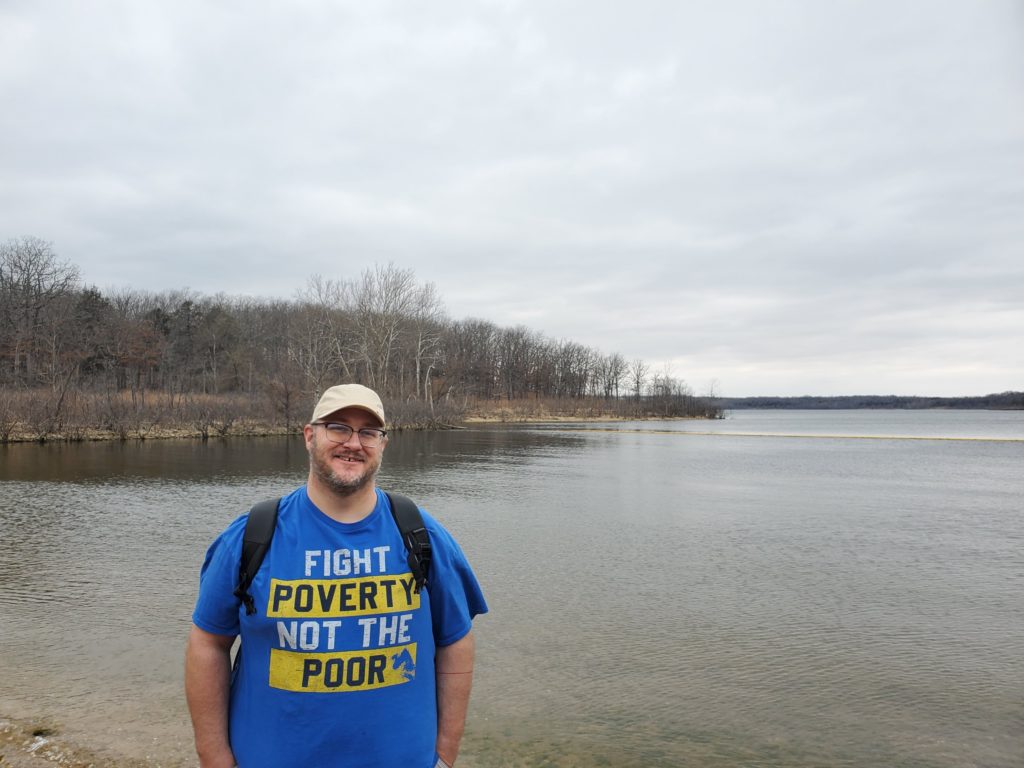This past Saturday evening I met my partner at the hospital where she works as a chaplain so we could eat dinner together, because there’s nothing better than a hot date in the deep recesses of a medical facility. As I was entering the building, a nurse, exiting with a patient, looked at me for an uncomfortable amount of time, then said, “I like your shirt!” I quickly looked down to recall which shirt I was wearing then replied to her, “Thanks!” and COVID-safe-smiled as best I could with my eyes.
This shirt is a deep blue with black, white, and yellow words: “Fight poverty, not the poor.” This statement is one of the demands of the Poor People’s Campaign, a grassroots organization working towards a moral revival in America. First enacted in 1968 by Ralph Abernathy and Martin Luther King, Jr., the Poor People’s Campaign at that time demanded economic and human rights for poor Americans from all backgrounds. The modern campaign, spearheaded by Reverends Liz Theoharis and William Barber III, presses forward to make this work a reality. For over fifty years, facing seemingly insurmountable injustices, activists have worked diligently to ensure equity, equality, inclusion, and fair wages. When I wear that shirt I feel like I am a part of this historic, important organism; my wearing that cloth is a small act of solidarity and when it’s acknowledged I feel like I’m doing God’s work.
That’s the first part.

The second is this: I was recently on a brief trip to Wal-Mart to pick up some loose ends for dinner. At the register I was approached by an older gentleman with he following story: “Hey, I was wondering if you could help me out. My wife and I are parked out front and we’re running on fumes – could you help us with some money to get some gas for our car? We’d really appreciate it…”
Time paused, but in the blink of an eye my mind kept working and I reviewed all the information I had: disheveled man, older, possibly unable to work, needing money for a specific thing, obviously in need. I should have stopped my analysis there, but I didn’t; I started questioning the man’s request: why is he seeking money for gas at the grocery store…what if he uses the money for drugs or alcohol…how many others has he gotten money from since he’s been here? In that split second I assumed the worst and talked myself out of helping him, justifying my impending response: I don’t have cash with me…someone else will help them…what if he wants more than what I give…will my generosity truly help him?
I responded in the most loving way possible, with that same COVID-safe-smile glowing from my eyes, “Sorry, I don’t have any cash…only a credit card.” I lied – I had my debit card. I denied assistance. I ignored this man’s plight because my brain, for whatever reason, couldn’t stop overthinking the situation. I couldn’t just open my damn hand and give freely as it was given to me. Not only was I a liar, but in my wearing that shirt I am a hypocrite as well. I am the one who is fighting against the poor. I am the one who is sustaining poverty. I am the oppressor.
—–
This week’s gospel lesson comes from the twelfth chapter of John, verses 1-8. Jesus has been in and around the village of Bethany, southeast of Jerusalem; it is here that his beloved friends Mary, Martha, and Lazarus live, and where the latter is resurrected. After this miraculous encounter, Jesus and company left town for a few days because of the growing plot to have our Lord killed, returning after some time spent in the wilderness region. The gospel of John reads:
Six days before the Passover Jesus came to Bethany, the home of Lazarus, whom he had raised from the dead. There they gave a dinner for him. Martha served, and Lazarus was one of those at the table with him. Mary took a pound of costly perfume made of pure nard, anointed Jesus’ feet, and wiped them with her hair. The house was filled with the fragrance of the perfume. But Judas Iscariot, one of his disciples (the one who was about to betray him), said, “Why was this perfume not sold for three hundred denarii and the money given to the poor?” (He said this not because he cared about the poor, but because he was a thief; he kept the common purse and used to steal what was put into it.) Jesus said, “Leave her alone. She bought it so that she might keep it for the day of my burial. You always have the poor with you, but you do not always have me.”
Mary’s perfume of spikenard originated in the Himalayan mountains and it’s sticker price of a year’s wages is justified – any object traveling that distance in those times would rightly be otherworldly expensive. And Mary, at the feet of Jesus, takes the stance of a servant, looking to wash and tend to the feet that have carried her friend countless miles. And Mary, in an act of love and devotion, pours out this perfume on Jesus’ feet to express her feelings for the man who has resurrected her brother…for the man who has invited her into ministry…for the man who saw her and loved her.
Judas feigns indignation about Mary’s love offering: “This perfume was worth a year’s wages! Why wasn’t it sold and the money given to the poor?” (CEB). Judas’ remark is meant to illicit some hurrahs from the onlookers, to express what he thinks the people want to hear – he’s talking the talk and calls out others to start walking the walk. The gospel writer makes a side remark, though, telling us that Judas didn’t actually care for the poor – he was pilfering money from the common funds and selling the perfume would give him more money to steal.
Judas’ hypocrisy, like mine in the grocery store, is glaringly apparent and, as much as I want to claim that I live a Jesus life the truth is that, more often than not, I live a Judas life. I will adamantly say all the right things and can preach a decent sermon about the sinfulness of selfishness. I can point out the places, programs, and people in my city that ignore the poor among us…I can complain about the local churches fighting to push out the poor that walk our streets…I can complain about how so many people ignore the woman on the corner that I ignore as well. I work to highlight just how bad poverty is and about how many things are paid for instead of solving the plight of the poor but at the end of the day I’m more concerned with my bottom line and not the emptiness in the bottom of my neighbor’s stomach. I’m living a Judas life dressed to look like Jesus.
Jesus’ rebuke of Judas’ comment is a rebuke for each of us who ignore the poor among us. His rebuke is for each of us who can’t see the individuals impoverished in our neighborhoods but send money to fund millionaire evangelists. His rebuke is for each of us who tell our poor neighbors to get a second or third job as we drive to our second or third vacation home. His rebuke is for each of us who dream of seeing Jesus someday while ignoring his image and likeness in the person across from us.
I can’t solve the poverty crisis in our country, but I shouldn’t let that stop me from working to end it. I can’t feed every person who asks for food, but I can certainly feed one or two. I can’t give all of my money to those in need, but I can certainly open up my hand. God, forgive me for ignoring your beloved. Forgive me for lying, for overthinking, for worrying. Help me to realize that the gifts you have given me are but gifts to be given. Help me to worry less about the wrong others might do with these gifts and let me find hope in the right they might do with them. Make me an agent to fight the systems, institutions, and thoughts that sustain poverty in this nation, and guide me to give and love as freely as Mary. May it be so.
much love. sheth.

